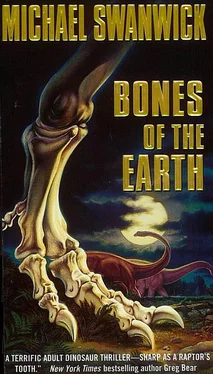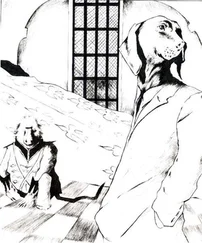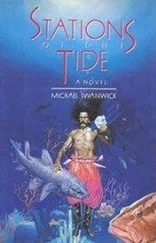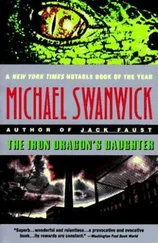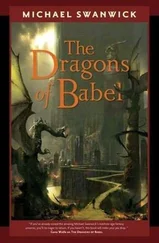It occurred to him that he would have to find a new Purgatorius colony now.
* * *
When Leyster strode into camp, humming the “Ode to Joy” to himself, there was no one about. The twin lines of tents were still and silent. A solitary dragonfly flew swiftly past him and was gone.
Somewhere in the distance the crazed-monkey laughter of a whooping loon rose up and then suddenly cut off, making the silence absolute. To one side of the camp was a stand of protomagnolias. The scent of their flowers hung heavy on the air.
“Hello?” he called.
A tent flap exploded open.
All in a rush, Daljit burst from Lydia Pell’s tent. She was crying. She seized Leyster and buried her face in his shoulder. “Oh, Richard,” she said. “Liddie’s dead!”
Clumsily, he put his arms around her. He stroked her hair as if she were a sorrowing child. “We did everything we could,” he said.
“She was a h-hero. She saved us all. W-when I heard the tape, I just stood there! I didn’t d-do a thing!”
“There, there,” he said awkwardly. “None of us did. Maybe it’s just a form of pride to imagine we should have, rather than just accepting how extraordinary it was what she did.” He was acutely aware of how pompous he sounded.
“You know what the w-worst part is? If Robo Boy had been a competent terrorist, she’d b-be alive now! That asshole! If she’d only had another t-twenty seconds…”
“There, now.”
“I haven’t felt like this since my m-mother died,” Daljit said. “I suppose I’ll be crying off and on for days this time too.”
She pulled back from him. Her face was round and red. The tears had abruptly shut off, but there were circles under her eyes and she looked worn and weary. These days had been hardest on her and on Matthew. They’d been the only two with any medical experience, but it belatedly occurred to Leyster that this chore should have been shared out more fairly.
“I’ll go wake up Matthew,” she said. “He’s resting in his tent. Will you tell the others?”
“Of course I will. Where are they?”
“Those who aren’t out looking for food are up the hollow, working on Jamal’s long house,” she said. Then, with absolutely no transition at all, “This bickering can’t go on.”
“I know.”
“It’s stupid.”
“Yes, it is.”
“Well, don’t just fucking agree with me. Do something about it! You’ve got to put an end to… I’m going to start crying again. Go on! Scoot!”
Weeping and hunched, she scuttled to Matthew’s tent and disappeared within.
Leyster hesitated, then ducked into the tent she had just vacated. It was hot inside, and dark. He waited for his eyes to adjust, then approached Lydia Pell’s cot.
Two flies were buzzing around her head. One tried to land, and he shooed it away.
In death, Lydia Pell had regained the face she had spent a lifetime creating. It was a serious, no-nonsense face, plain and round-cheeked. But one who knew her could see how amenable it would be to a smile or a wry twist of her features. He could see her now, looking up from her knitting with that one particular expression that said would you believe it? Followed by another that meant well, people are funny.
“Shoo,” Leyster said absently. “Shoo, fly.”
That face had been lost in pain in the ten days since the explosion. He was glad to see it back. He was doubly glad that Daljit had closed the eyes, so he didn’t have to see them staring back at him from the far side of death.
“Good-bye, Liddie,” he said softly. “I wish to God we had you with us now. You’d do so much better a job wrangling this bunch than I can. I miss you already. But I’m glad you’re at peace now.”
One fly landed, and began walking back and forth across the tender strip of flesh between her lips and nostrils. He raised a hand to shoo it away yet again, then thought the better of it. She was dead. Her body was no longer of any use to her.
“I’ll get everybody together again. Somehow. I promise.”
He could think of nothing more to say. He dried his eyes and left.
* * *
So Leyster walked, alone, up Smoke Hollow to the new campsite. The way darkened as the proto-magnolias gave way first to cedars and then to redwoods. The redwoods were still young and grew close together enough to serve as a barrier to the larger dinosaurs. Still, it might make sense to sharpen and lash together triads of logs into a line of cheveaux-de-frise to discourage any medium-size predators that might happen along. Or maybe they could plant thorn bushes. He sighed. There was so much to do! Chances that were worth taking for a month’s stay just weren’t tolerable over the span of a lifetime.
He stepped into the clearing around the long house. A thin curl of smoke rose up from the fire they kept banked to preserve the wood and their limited supply of matches.
“Hello!” Leyster called. “Anybody here?”
Jamal was standing on the ridgepole of the long house, shirt tied around his waist and a kerchief around his head. He waved jubilantly when he saw Leyster coming, and shouted, “We’ve finished thatching the roof! I’m putting up the satellite dish now. Come up and take a look. The others have gone out for more leaves.”
Jamal, for all his faults, had extraordinary powers of organization and persuasion. He’d worked his faction hard and well. The long house frame was complete, and the palm-frond roof looked convincingly rainproof. Gazing up at it, Leyster for the first time actually believed in his heart of hearts that they were here for good. That they were never going home to the Cenozoic. That, for good or ill, this was their home now.
Leyster took his glasses off, ran a hand over his face, and put them back on. “Come on down!” he shouted. “I have something important to tell you!”
Jamal went to the edge of the roof and looked down at him. “What?”
“It’s better said face-to-face,” Leyster said. “Really.”
With a puzzled scowl, Jamal squatted down and reached over to grab the frame.
At that moment, the rain began to pelt down harder. Leyster quickly stepped under the shelter of the half-built long house. The sky opened then, and the rain came down torrentially. It was dry in here, though. Jamal’s gang had built a good roof.
With a rattle of dried fronds, Jamal jumped down from a crosspiece of the frame. He landed with a thump. The momentary elation he had displayed on the rooftop was gone. His features were sullen and flooded with shadow. “Well?” he said challengingly. “What is it?”
Washington, D.C.: Cenozoicera. Quaternary period. Holocene epoch. Modern age. 2045 C.E.
They held the paper autopsy in a conference room that looked like every other conference room Molly Gerhard had ever seen.
Griffin’s people had been given administrative space in the Herbert Hoover Building on Constitution Avenue. It was an inadequate run of offices squeezed from the Department of Commerce by DOD functionaries anxious to keep Griffin at arm’s length from the Pentagon and the actual workings of time travel. Occasional use of the conference room was only grudgingly permitted by the Bureau of Export. But it had a snazzy new Japanese whiteboard, and a conference table, and that was all she really needed.
“Don’t get your hopes too high,” Tom Navarro said. “We have a very weak case here.”
“I think it’s stronger than you think,” she said. “I’m betting we can sell it.”
She laid the papers out on the table in strict chronological order, with Robo Boy’s birth certificate in the upper left-hand corner, and her summary brief in the lower right.
Читать дальше
